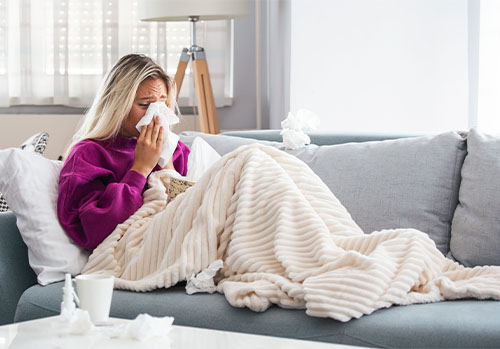
Image by Graphicroyalty
Cold Season is Upon Us
As the autumn breeze starts to roll in, I usually find myself suffering from a cold or extreme allergies. Every season, I hope to put an end to my cold streak, but somehow continue to find myself in the same situation− runny nose, stuffy head, and lingering cough that seem to stick with me for weeks! Like clockwork, I pull out my nasal spray and allergy medication, which usually fails to treat my symptoms. Like me, many of you may suffer from seasonal allergies and colds. Let’s discuss a few preventative measures that may help you avoid infection and how to reduce your symptoms naturally this cold season.
Common Cold Basics
A common cold is a widespread upper respiratory infection that affects millions of Americans each year. Common colds are the main reason why many Americans miss school or work throughout the year− occurring about 2-3 times annually in adults, and more frequently in children with approximately 8-12 infections per year. This infection is usually caused by a virus called rhinovirus, which is the most spread virus year-round with seasonal peaks in the early months of spring or fall, hence seasonal allergies and cold spikes.
Infectious germs are easily spread by close personal contact, eating, drinking, or touching items of a person who is infected. Infection can occur by inhaling droplets that have been released into the air via talking, breathing, or failing to cover the mouth and nose during a cough or sneeze. These germy droplets may reside on many common surfaces and can enter the body by touching your eyes, mouth, or nose after contacting an infected surface. Symptoms like a sore throat, stuffy or runny nose, sneezing, stubborn cough, mild headaches, body aches, and sometimes low-grade fever may appear within 2-3 days of infection, with symptoms lasting for approximately 7-10 days or longer.
Common Cold Prevention
Although there is no vaccination or cure for a common cold, there are many ways to avoid spreading germs or becoming infected. Here are a few precautionary measures that you can take to not only protect yourself but those around you.
- Regularly wash your hands with soap and water for at least 20 seconds. If not available, use an alcohol-based hand sanitizer. Always disinfect your hands properly after you cough, sneeze, or blow your nose to avoid spreading germs.
- During a cough or sneeze, avoid using your hands. Instead, use a disposable tissue or the inside of your sleeve to cover your mouth and nose.
- Avoid touching parts of your face, nearby spaces, or others around you with unwashed hands.
- Make sure you or your loved ones remain at home while sick and avoid close contact with others, especially when you cough or sneeze.
- Properly disinfect frequently touched surfaces in your homes, such as doorknobs, mobile devices, or toys during and after sickness to rid your household of lingering germs. Viruses can live on surfaces for several hours, so disinfect thoroughly each day.
Natural Remedies to Ease Symptoms
It can be tough determining how to tend to your body when you are experiencing a multitude of symptoms. However, there are a few practical ideas that you may start with. Your body works extra hard to fight off infections, so it is vital to rest your body. Proper hydration can detoxify your systems, break down bacteria through waste, and flush mucus congestion out of your body. Soothe your sore throat with hot substances like herbal tea with lemon, or gargle warm salt water to break up bacteria-filled mucus and spit it out. You can consume soup or warm broth to slow white blood cell movement and concentrate them in areas that require healing. No wonder soup was always on the menu when we were sick as children! Lastly, linger in a steamy bathroom with hot running water to reduce nasal and throat inflammation, ease breathing, and break up congestion. These tips will not provide you with a cure, however, they may relieve symptoms while you’re under the weather.
A cold is generally not a cause for concern and should go away on its own as your body fights off infection. Make note, if your symptoms tend to worsen or last over 2 weeks, consult with a trusted healthcare provider to discuss your symptoms. I will be taking extra precautions this cold season in hopes of decreasing my risk of infection, lessening symptoms if I do get sick, and protecting those around me. You should too!
Have Health Insurance Questions?
We hope that this information on common colds is helpful for you.
Insurance is oftentimes overwhelming and we want to shed light on the industry by answering your questions. Comment below and your question may be the topic of our next post!
If you liked this article, share it with your friends!
Empower Brokerage wants to help you find the insurance coverage you need and how to save money getting it. Stay on top of your health and give us a call at (844) 410-1320.
Get affordable health insurance quotes by clicking here.
See our other websites:

